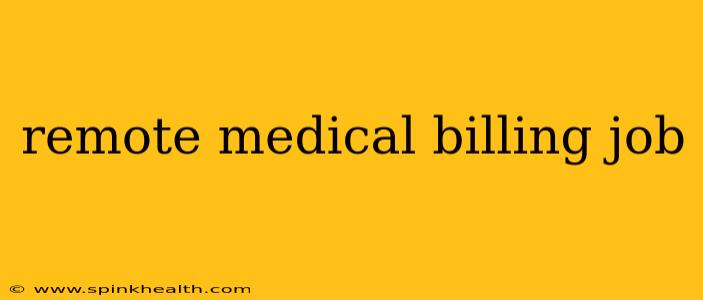The hum of the office, the constant ringing of phones – for many, the traditional medical billing environment feels a world away. But the rise of remote work has opened up incredible opportunities, transforming the medical billing landscape. More and more professionals are discovering the freedom and flexibility of a remote medical billing job. This comprehensive guide will explore everything you need to know about this exciting career path, answering your burning questions and helping you navigate the world of remote medical billing.
What are the requirements for a remote medical billing job?
Landing your dream remote medical billing role requires a blend of skills and experience. Think of it like building a house – you need a strong foundation (education and certification), sturdy walls (relevant experience), and a beautiful roof (strong soft skills). Most employers seek candidates with a minimum of an associate's degree in medical billing and coding, or a related field. However, a high school diploma coupled with relevant experience and certifications can also open doors. Crucially, proficiency in medical billing software, like those from Epic or Cerner, is highly valued. Your ability to understand medical terminology and procedures is also non-negotiable – you'll need to decipher complex medical codes and documentation accurately. Finally, strong attention to detail, problem-solving skills, and excellent communication are essential for success in any medical billing role, especially when working remotely.
What is the average salary for a remote medical billing job?
The average salary for a remote medical billing job varies based on experience, location, and the specific employer. However, you can expect a competitive salary reflecting your expertise. Entry-level positions may start at a lower range, but with experience and demonstrated proficiency, your earning potential significantly increases. Factors like your knowledge of specific billing software, your certifications (like Certified Professional Coder – CPC or Certified Billing and Coding Specialist – CBCS), and your speed and accuracy in handling claims all play a significant role in determining your compensation. Online salary aggregators can offer insights into the average salary range for remote medical billing roles in your geographic area, helping you to gauge reasonable expectations.
What are the advantages of working as a remote medical billing specialist?
The allure of a remote medical billing job lies in its unparalleled flexibility. Imagine setting your own hours, working from the comfort of your home office, and ditching the daily commute – this is the reality for many remote medical billing specialists. This flexibility often translates into improved work-life balance, allowing you to better manage personal responsibilities. Additionally, the ability to work remotely expands your job market considerably, opening up opportunities with companies across the country, or even internationally. This can be particularly appealing to individuals living in areas with limited local job options. Finally, many companies offering remote medical billing positions provide the necessary technology and support, allowing you to focus on your work without the hassles of setting up and maintaining your own IT infrastructure.
What are the disadvantages of working as a remote medical billing specialist?
While remote work offers numerous advantages, it's crucial to acknowledge potential challenges. The lack of direct face-to-face interaction with colleagues can lead to feelings of isolation for some individuals. Building and maintaining professional relationships requires extra effort and initiative. Maintaining a productive workspace at home can also be a challenge – distractions and household responsibilities can easily disrupt workflow. It’s essential to establish clear boundaries between work and personal life to avoid burnout. Furthermore, depending on the employer, you might need to invest in your own equipment (like a reliable computer and internet connection), though many companies provide these resources. Finally, strict adherence to confidentiality and data security protocols is paramount in medical billing, requiring a high level of self-discipline and responsibility when working remotely.
How do I find a remote medical billing job?
Finding the right remote medical billing job requires a strategic approach. Start by updating your resume and tailoring it to highlight your relevant skills and experience. Focus on quantifiable achievements, emphasizing your efficiency and accuracy in medical billing. Online job boards (like Indeed, LinkedIn, and Monster) are excellent starting points. Remember to use relevant keywords, such as "remote medical billing," "work from home medical biller," or "virtual medical billing specialist." Networking is also crucial – connect with professionals in the medical billing field through online forums and professional organizations. Don't underestimate the power of direct applications – research companies that offer remote opportunities and submit your application directly to their human resources department.
The path to a successful remote medical billing career is paved with dedication, skill, and strategic planning. By understanding the requirements, advantages, and disadvantages, you can confidently embark on this fulfilling journey from the comfort of your home office.

